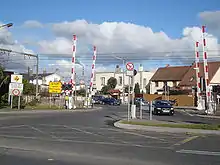
The Merrion Gates (Irish: Geataí Mhuirfean)[1] is a railway level crossing in Sandymount, Dublin, Ireland, where the DART and Dublin–Rosslare railway line crosses Strand Road near its junction with Merrion Road. There is pedestrian access to Sandymount Strand immediately to the east of the railway crossing.
First built in 1834,[2] the junction is a "notorious" traffic bottleneck,[3] which also restricts the possible frequency of railway traffic.[4] The term "Merrion Gates" is sometimes used to refer to the surrounding area,[1] and a number of nearby businesses take their name from the junction.[5][6]
History
The Merrion Gates site is close to the former Merrion Castle, which was destroyed during the Irish Rebellion of 1641.[7] The railway line and gates were built in 1834,[2] at a site described in some sources as a "symbolic entry point to the inner city".[8] Important passengers, who travelled to Dublin by train from Dún Laoghaire port, were sometimes greeted at the Merrion Gates – including the Papal legate in advance of the 1932 Eucharistic Congress of Dublin.[9]
In 1921, during the Irish War of Independence, the Merrion Gates were the site of an ambush and shootout which resulted in the deaths of two civilians.[10][11]

The Merrion Gates railway crossing lies just north of the former Merrion railway station. This station opened in 1835 and closed in 1935.[12] Neighbouring stations, still in operation, include Sydney Parade to the north and Booterstown to the south.
Development proposals
As of the early 21st century, the Merrion Gates are a well-known and "notorious" traffic bottleneck,[4] where the gates have been reportedly "closed for up to 20 minutes per hour at peak times".[3]
In 2016, the National Transport Authority unveiled a proposal to close the Merrion Gates and to divert motor traffic onto a new road bridge to be built over the railway approximately 250 metres to the north. The proposal expected that pedestrian and cycle traffic would be routed through a tunnel under the crossing.[3][13] As of mid-2018, these proposals had reportedly been "shelved".[14]
References
- 1 2 "Geataí Mhuirfean / Merrion Gates". logainm.ie. Placenames Database of Ireland. Retrieved 20 May 2022.
- 1 2 Oram, Hugh (2018). "Merrion Gates". The Little Book of Merrion and Booterstown. History Press. ISBN 9780750989497.
- 1 2 3 Paul Melia (27 October 2016). "€50m plan to end traffic nightmare at level crossing on Dart tracks". Irish Independent. Retrieved 27 October 2016.
- 1 2 Kelly, Olivia (29 October 2016). "Dublin 4 residents shocked at plan to fix Merrion Gates bottleneck". irishtimes.com. Irish Times. Retrieved 20 May 2022.
Listeners to morning traffic reports will be familiar with the Merrion Gates, even if they've never been through them. [..] This bottleneck railway crossing causes persistent daily tailbacks
- ↑ "Merrion Gates Medical Centre – About Us". merriongatesmedical.ie. Retrieved 20 May 2022.
- ↑ "Centra – Merrion Gates". centra.ie. Retrieved 20 May 2022.
- ↑ Dawe, Gerald; Mulreany, Michael (eds.). The Ogham Stone: An Anthology of Contemporary Ireland.
Their [Fitzwilliam] residence, Merrion Castle, destroyed during the rebellion of 1641, was opposite the railway crossing at Merrion Gates
- ↑ Whelan, Yvonne (2014). Jackson, Alvin (ed.). The Oxford Handbook of Modern Irish History. Oxford University Press. p. 90. ISBN 9780191667602.
When the cortège arrived at Merrion Gates, the symbolic entry point to the inner city, the Papal Legate was formally welcomed by the Lord Mayor of Dublin
- ↑ Morrissey, Thomas J. (2010). Edward J. Byrne, 1872–1941: The Forgotten Archbishop of Dublin. Columba Press. p. 199. ISBN 9781856077033.
At Merrion Gates, the boundary of the city of Dublin, there was a further reception party [for the Papal legate]
- ↑ Holan, Mark (8 December 2016). "Mrs. Brophy's Late Husband". theirishstory.com. Retrieved 20 May 2022.
- ↑ "WS1773 – Statement of Witness – Patrick J. Brennan – page 16" (PDF). militaryarchives.ie. Bureau of Military History. Retrieved 20 May 2022.
- ↑ "Merrion" (PDF). Railscot – Irish Railways. Retrieved 12 January 2010.
- ↑ "Sandymount / Merrion to Blackrock Corridor Study – Public consultation document" (PDF). National Transport Authority. October 2016. Retrieved 27 October 2016.
- ↑ Kelly, Olivia (4 June 2018). "Merrion Gates closure plan shelved". irishtimes.com. Irish Times. Retrieved 20 May 2022.